- From Bangladesh to India October 30, 2021
SRM-AP is like a home away from home to me. There is never a dull moment on this campus. Students are always engaged in studies or extracurricular activities. I am happy that I travelled to a new country, learned a new culture and made a lot of new friends here. The activities of clubs and societies made my campus life more vibrant.
-Mahjabeen Tamanna
Continue reading →
Mechanical Engineering - BSc Physics student contributes as the First Author for a research paper October 29, 2021
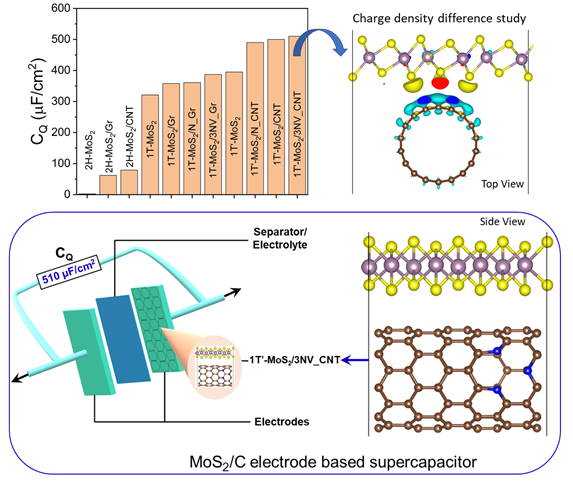 A research paper titled “First Principle Identification of 2D-MoS2 based Composite Electrodes for Efficient Supercapacitor Application” is published by Samadhan Kapse, PhD student, as First Author and Bennet Benny, BSc Physics Student, (Same Contributed First Author) in the Journal of energy storage, Elsevier having an Impact Factor of 6.583. The paper publication has been guided and supervised by Dr Pranab Mandal (Co-Author) and Prof Ranjit Thapa (Corresponding Author) from the Department of Physics, SRM University-AP.
A research paper titled “First Principle Identification of 2D-MoS2 based Composite Electrodes for Efficient Supercapacitor Application” is published by Samadhan Kapse, PhD student, as First Author and Bennet Benny, BSc Physics Student, (Same Contributed First Author) in the Journal of energy storage, Elsevier having an Impact Factor of 6.583. The paper publication has been guided and supervised by Dr Pranab Mandal (Co-Author) and Prof Ranjit Thapa (Corresponding Author) from the Department of Physics, SRM University-AP.1T Molybdenum disulfide (1T-MoS2) has been widely studied experimentally as an electrode for supercapacitors due to its excellent electrical and electrochemical properties. Whereas the capacitance value in MoS2 is limited due to the lower density of electrons near the Fermi level, and unable to fulfil the demand of industry i.e. quantum capacitance preferably higher than 300 μF/cm2. Here, we investigated the performance of 2H, 1T, and 1T’ phases of MoS2 in its pristine form and heterostructures with carbon-based structures as an electrode in the supercapacitors using density functional theory. Specifically, we reported that the underneath carbon nanotube (CNT) is responsible for the structural phase transition from 1T to 1T’ phase of MoS2 monolayer in 1T’-MoS2/CNT heterostructure. This is the main reason for a large density of states near the Fermi level of 1T’-MoS2/CNT that exhibits high quantum capacitance (CQ) of 500 μF/cm2 at a potential of 0.6 V. Also, we observed that the nitrogen doping and defects in the underneath carbon surface amplify the CQ of heterostructure for a wider range of electrode potential. Therefore, the 1T’-MoS2 /N doped CNT can be explored as an electrode for next-generation supercapacitors.
Today’s increasing demand for energy storage technologies is highly dependent on batteries, fuel cells, supercapacitors, etc. The supercapacitors are greatly efficient due to advantages such as high power density, wide operating temperature range, large charge-discharge cycles. The recent focus of researchers is to find promising electrode materials for supercapacitor application. Among all reported works, the MoS2 nanosheet is found to be a prime candidate for supercapacitors with a high power density as well as energy density. Therefore, it is important to understand the origin of capacitance in MoS2 and their composites to design promising electrodes for supercapacitors. Also, the identification of ideal MoS2 based composites for efficient supercapacitor application is a grand challenge using only experimental approaches.
Using density functional theory, we can identify the promising electrode materials for supercapacitor application based on various graphene, 2D metal chalcogenides and their heterostructures. The quantum capacitance (CQ) is the cost-effective method to estimate the performance of any low density of states materials such as graphene, MoS2, etc towards supercapacitors.
Continue reading → - SRMAP Faculty Enlisted in Stanford Global List of Top 2% Scientists October 29, 2021
Daily Pioneer – Oct 23
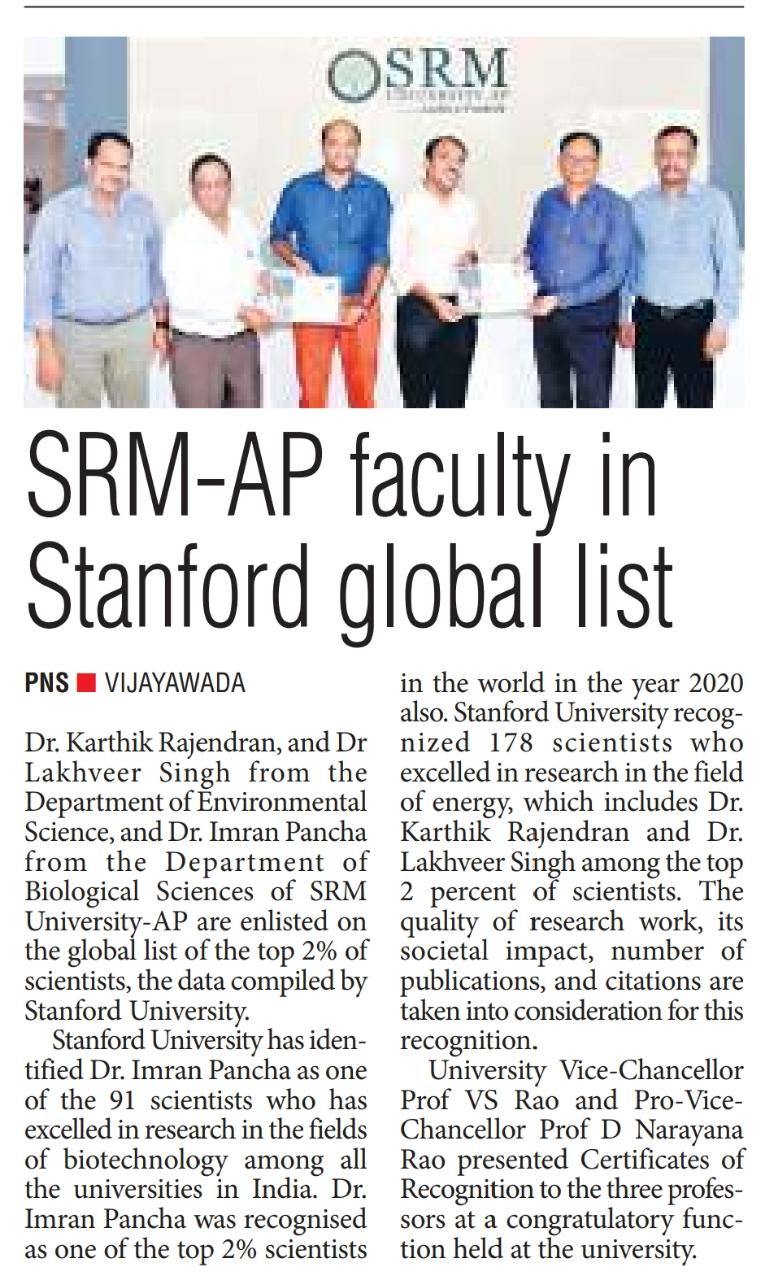
Trinity Mirror – Oct 23

The Hawk – Oct 23
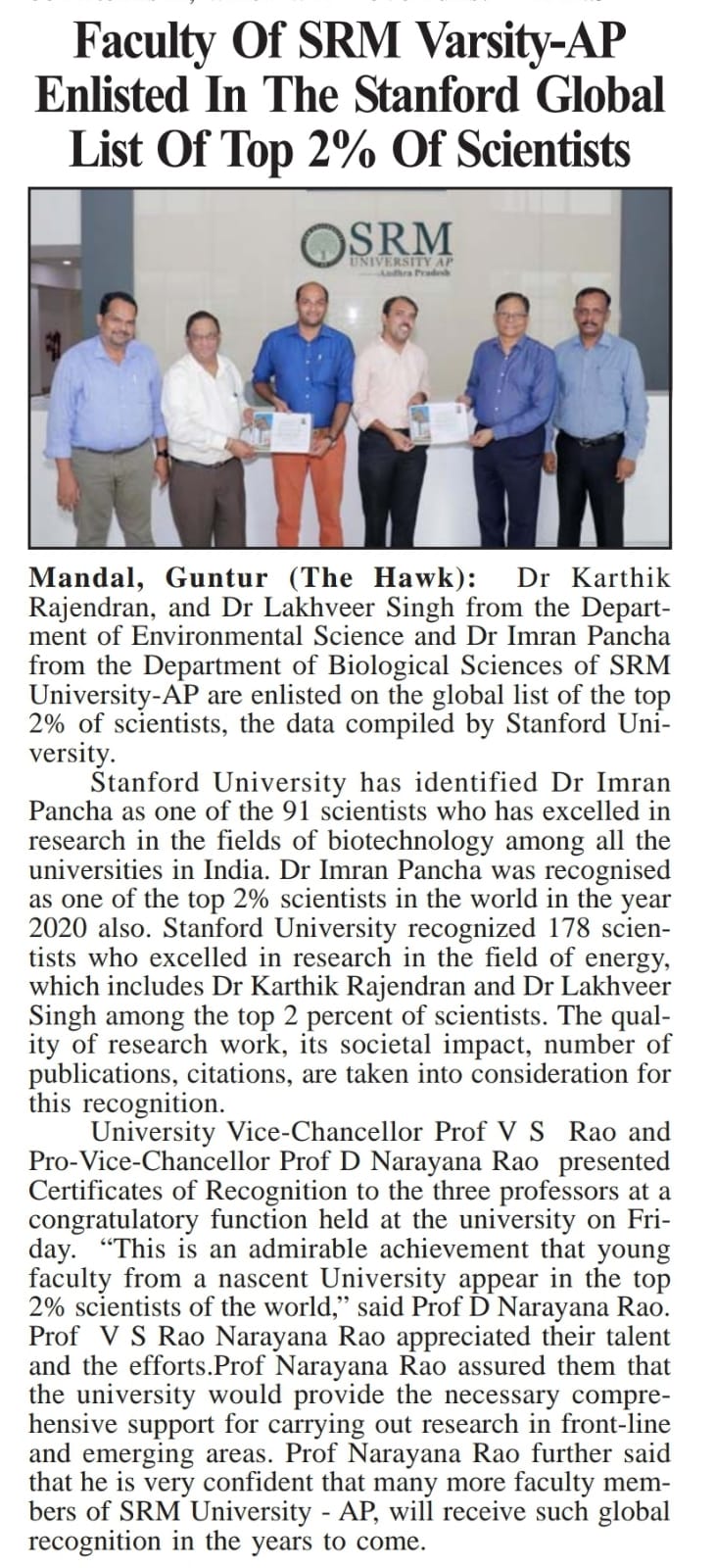
Sakshi – Oct 23
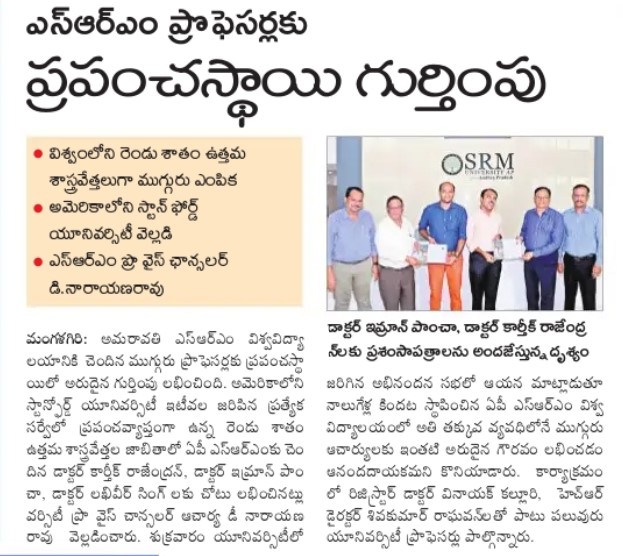
Andhra Prabha – Oct 23
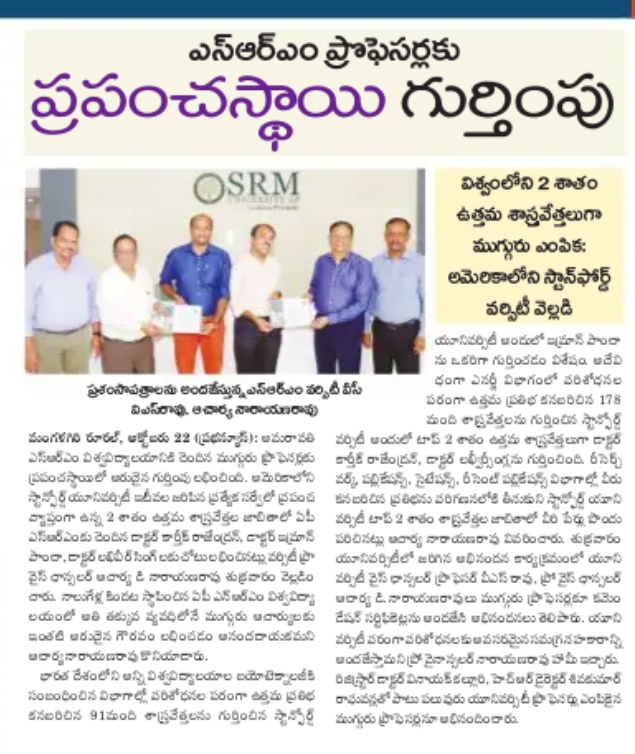
PrajaSakthi – Oct 23
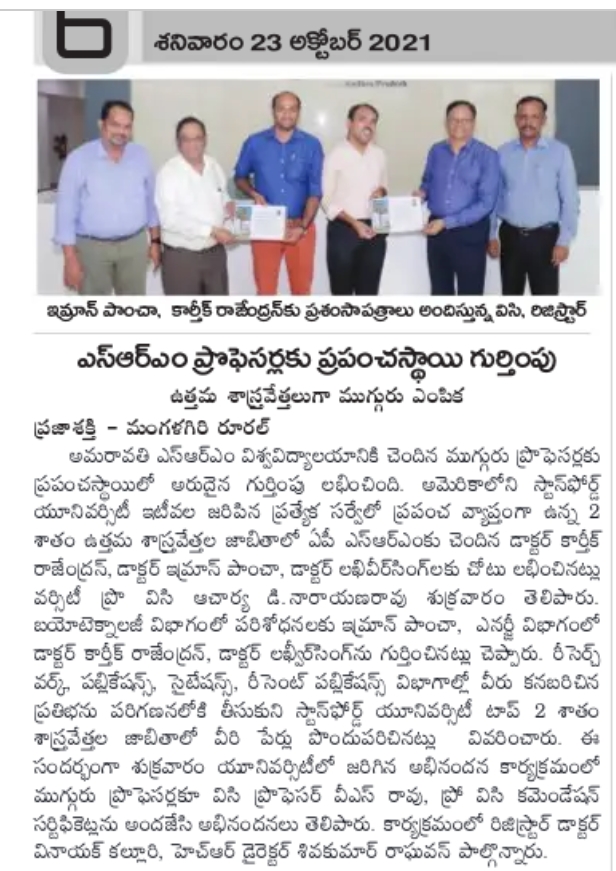
Surya – Oct 23
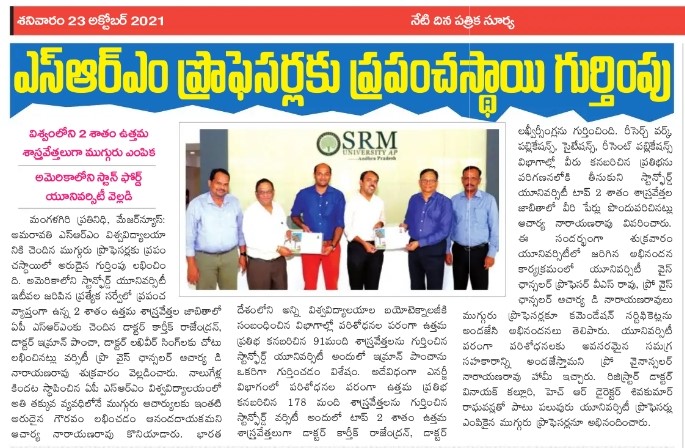
Visalaandhra – Oct 23
Continue reading →
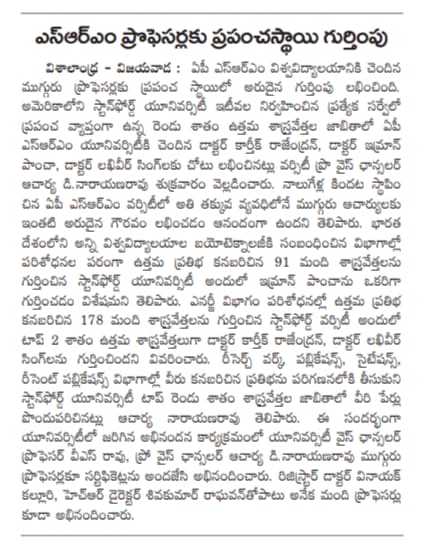
- Upping our A-game with NITTTR Chennai and SRM faculties October 27, 2021
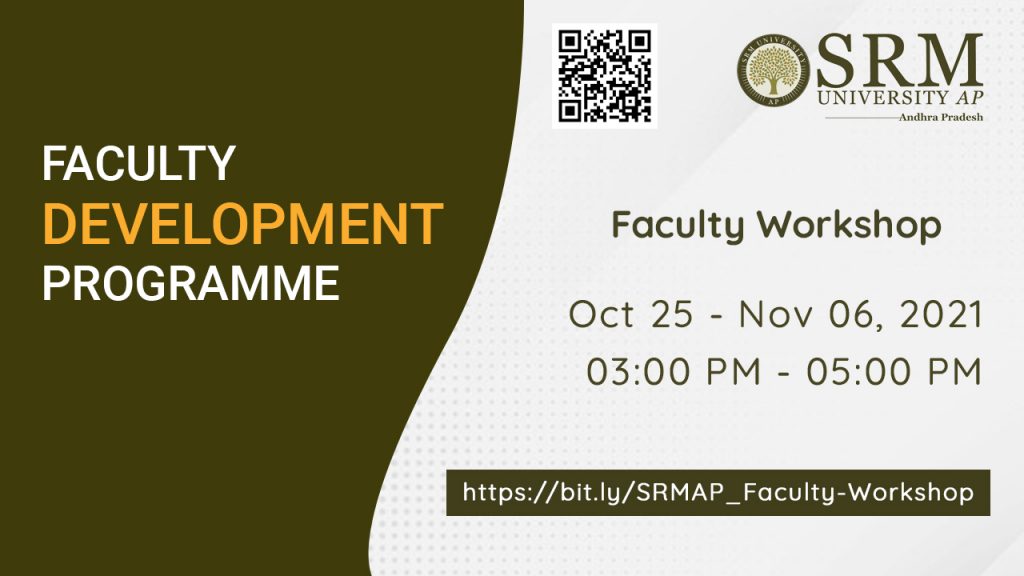 The Faculty and Academic Affairs unit is hosting a Faculty Development Program (FDP), an initiative of the SRM University-AP Teaching Learning Centre (TLC), which was inaugurated on October 25, 2021, at 2:45 pm by Prof. V S Rao, our esteemed Vice-Chancellor who graced the event as the Chief Guest and the revered Prof. Usha Natesan, Director, National Institute of Technical Teachers Training and Research (NITTTR) Chennai as the Guest of Honour in the occasion.
The Faculty and Academic Affairs unit is hosting a Faculty Development Program (FDP), an initiative of the SRM University-AP Teaching Learning Centre (TLC), which was inaugurated on October 25, 2021, at 2:45 pm by Prof. V S Rao, our esteemed Vice-Chancellor who graced the event as the Chief Guest and the revered Prof. Usha Natesan, Director, National Institute of Technical Teachers Training and Research (NITTTR) Chennai as the Guest of Honour in the occasion.This FDP will be an opportunity to nurture the finest traits that our faculty members have to offer by inviting five faculty members from NITTTR Chennai. Dr G. Janardhanan (Course coordinator), Dr P. Malliga, Dr S. Renukadevi, Dr V. Shanmuganeethi, and Dr E. S. M. Suresh from NITTTR Chennai; Dr Balgauruprasad Narayanan (Course Coordinator), and Dr Anupama Ghattu from Teaching Learning Centre (TLC) SRM University-AP, and Dr Rajeev Sukumaran from the Centre for Applied Research (CARE), SRMIST will be the resource persons for this event.
NITTTR Chennai is a Ministry of Education, Government of India-funded institution. The SWAYAM-MOOCs (Massive Open Online Courses) courses offered by NITTTR have become very popular among the teachers’ community as easy-to-access resources.
The entire FDP will be conducted in four batches and over 170 faculty members of SRM University will participate in it to learn about the latest developments in pedagogical methods and their incorporation in the classroom setting. The events for the first batch will continue from October 25, 2021, till November 6, 2021, from 3.00 pm to 5.00 pm every day coming up to a total of 10 sessions.
This Faculty Development Program jointly designed by NITTTR Chennai and SRM University-AP will give our educators the essential tools needed to make every classroom experience an unrivalled growing opportunity for the students. We urge our faculty members to make the most of this event from October 25, 2021, onwards.
Click here:https://bit.ly/SRMAP_Faculty-Workshop
Continue reading → - Dr. Anirban Bose October 26, 2021

